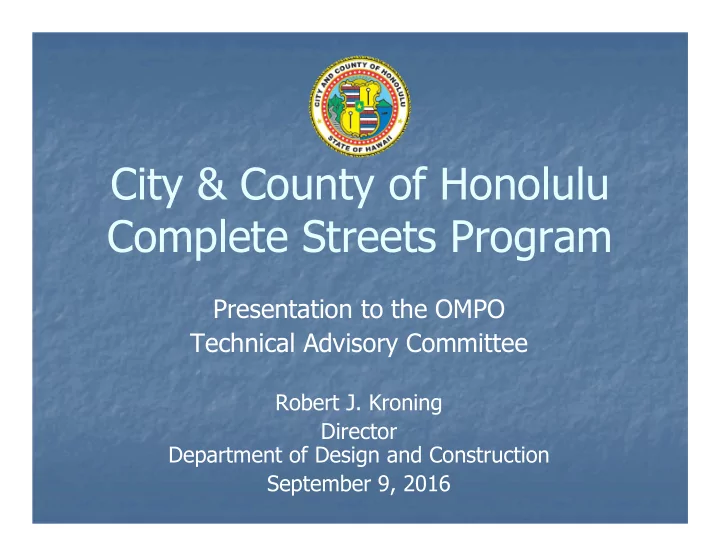

City & County of Honolulu Complete Streets Program Presentation to the OMPO Technical Advisory Committee Robert J. Kroning Director Department of Design and Construction September 9, 2016
Complete Streets The Law The Design Manual The Standard Operating Procedures Local Examples
The Law HRS 264-20.5 Requires that “… county transportation departments shall adopt a complete streets policy that seeks to reasonably accommodate convenient access and mobility for all users of the public highways … including pedestrians, bicyclists, transit users, motorists, and persons of all ages and abilities.” ROH 14-33 Requires that “Every transportation facility or project, whether new construction, reconstruction, or maintenance, provide the opportunity to implement complete streets …”
Principles of Complete Streets Improve Safety Context sensitive solutions Accessibility and mobility for all Balance the needs and comfort of all modes and users Use national best practices Provide non-motorized options Encourage physical activity Think: “long-term investment” Build partnerships statewide Incorporate trees and landscaping
Complete Streets Checklist Required by ROH Developed by DPP, DTS, DFM and DDC When should the checklist be completed? Planning tool or Design capture Completed checklists filed and posted by DPP Directors shall update from time to time
Complete Streets Design Manual Guidelines for designing streets Consistent with national best practices Based on input from many stakeholders Will replace outdated, auto-centric standards Approved 2016
Complete Streets Implementation Standard Operating Procedure (1 of 2) Creates a Complete Streets Team Full time administrator Part time departmental coordination & expertise Analyze (use checklist) Rehab of Streets priorities Transportation CIP Other Select Minor or no requirement Further review
Complete Streets Implementation Standard Operating Procedure (2 of 2) Plan Create project packages Context sensitive input Traffic studies Accident history Neighborhood/TOD plans Oahu Bicycle Master Plan Parks and Rec input Directors approval Design and Construct Update Checklist
Ulune Street Demonstration Project Installed in 2014 Striping used to “narrow” Before street “Stop for Pedestrians” signage First new use of back-in angle parking on Oahu Site visits show the project performing as planned (traffic calming) After
Implementation Study Projects 10
Conceptual Designs Nuuanu Avenue
Rail Station Area Walk Audits Five walking audits held Nov 2013 to March 2014 Total of 20 out of 21 station areas examined 20-30 participants at each event (5 events total) Multiple agencies and stakeholders represented Prior to tour: Overview of Station Area with supporting materials and discussion
King Street Protected Bike Lane Opened one-way December 2014 Converted to two-way in 2015 2 year pilot project
Results for South King Street at Kalākaua Avenue 88% Increase in bicycle ridership No One-way protected bike lane Two-way protected bike lane bike lane 800 700 Number of People Bicycling 600 500 400 300 200 100 0 8/26/2014 8/27/2014 2/10/2014 2/11/2015 3/4/2015 3/5/2015 4/8/2015 4/9/2015 5/5/2015 5/6/2015 5/7/2015 6/2/2015 6/3/2015 6/4/2015 Date
Mahalo!
Recommend
More recommend